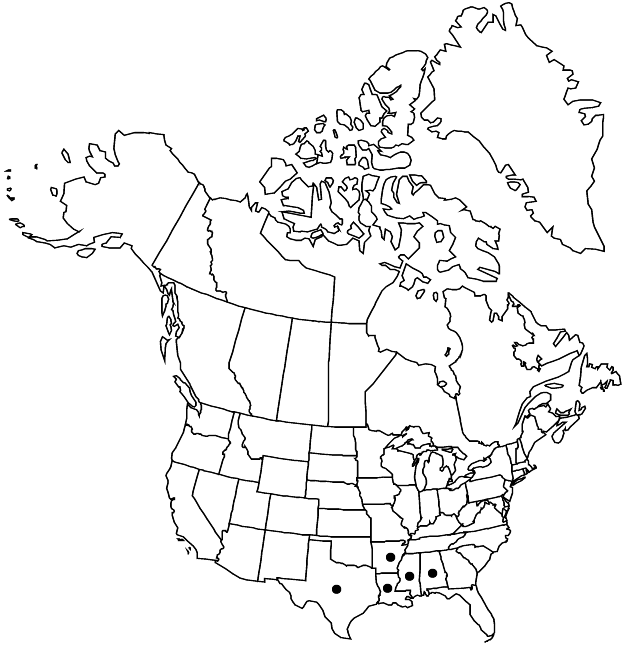Difference between revisions of "Crassula longipes"
Kew Bull. 39: 712. 1984,.
FNA>Volume Importer |
imported>Volume Importer |
||
| (6 intermediate revisions by 2 users not shown) | |||
| Line 6: | Line 6: | ||
|place=39: 712. 1984, | |place=39: 712. 1984, | ||
}} | }} | ||
| − | |basionyms={{Treatment/ID/ | + | |basionyms={{Treatment/ID/Basionym |
|name=Tillaeastrum longipes | |name=Tillaeastrum longipes | ||
|authority=Rose | |authority=Rose | ||
| + | |rank=species | ||
| + | |publication_title=Contr. U.S. Natl. Herb. | ||
| + | |publication_place=13: 301. 1911 (as Tilleastrum) | ||
}} | }} | ||
|synonyms= | |synonyms= | ||
| Line 25: | Line 28: | ||
|elevation=0-400 m | |elevation=0-400 m | ||
|distribution=Ala.;Ark.;La.;Miss.;Tex.;Mexico;s South America. | |distribution=Ala.;Ark.;La.;Miss.;Tex.;Mexico;s South America. | ||
| − | |discussion=<p>M. Bywater and G. E. Wickens (1984) showed Crassula longipes in southern Florida, but according to D. B. Ward (pers. comm.), the record is probably based on a W. M. Carpenter collection from East Feliciana Parish, Louisiana.</p> | + | |discussion=<p>M. Bywater and G. E. Wickens (1984) showed <i>Crassula longipes</i> in southern Florida, but according to D. B. Ward (pers. comm.), the record is probably based on a W. M. Carpenter collection from East Feliciana Parish, Louisiana.</p> |
|tables= | |tables= | ||
|references= | |references= | ||
| Line 34: | Line 37: | ||
-->{{#Taxon: | -->{{#Taxon: | ||
name=Crassula longipes | name=Crassula longipes | ||
| − | |||
|authority=(Rose) M. Bywater & Wickens | |authority=(Rose) M. Bywater & Wickens | ||
|rank=species | |rank=species | ||
| Line 49: | Line 51: | ||
|publication year= | |publication year= | ||
|special status= | |special status= | ||
| − | |source xml=https:// | + | |source xml=https://bitbucket.org/aafc-mbb/fna-data-curation/src/2e0870ddd59836b60bcf96646a41e87ea5a5943a/coarse_grained_fna_xml/V8/V8_303.xml |
|genus=Crassula | |genus=Crassula | ||
|species=Crassula longipes | |species=Crassula longipes | ||
Latest revision as of 22:42, 5 November 2020
Plants aquatic or terrestrial, annual. Stems spreading (in water) or erect, yellow in age, branched, to 25 cm if aquatic, to 5 cm if terrestrial. Leaf blades lanceolate to oblanceolate, 2–5 mm, apex acute to obtuse. Inflorescences lax; flowers 1 per node. Pedicels 1–8 mm. Flowers 4-merous; sepals triangular-ovate, 0.4–0.7 mm, apex obtuse; petals lanceolate, 1.1–1.7 mm. Follicles ascending, 12–14-seeded, obliquely lanceoloid; old follicles spreading, flat. Seeds oblong with rounded ends, 0.2–0.4 × 0.1–0.2 mm, not papillate, dull, rugulose.
Phenology: Flowering spring.
Habitat: Aquatic or in wet sand or mud
Elevation: 0-400 m
Distribution

Ala., Ark., La., Miss., Tex., Mexico, s South America.
Discussion
M. Bywater and G. E. Wickens (1984) showed Crassula longipes in southern Florida, but according to D. B. Ward (pers. comm.), the record is probably based on a W. M. Carpenter collection from East Feliciana Parish, Louisiana.
Selected References
None.